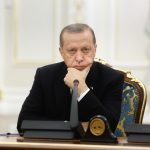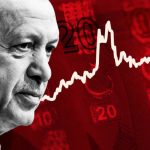(Bloomberg Opinion) — It may be the closest thing to a foreign-policy success that President Recep Tayyip Erdogan has had in years: Turkey’s intervention in Libya’s civil war has seemingly turned the tide in favor of the side he is backing. After a string of military successes by the Government of National Accord, the rebel commander Khalifa Haftar has been obliged to offer — under the convenient cover of Ramadan — a truce.
There is no doubt where the credit is due. The GNA was down and very nearly out at the end of last year, when Erdogan decided to provide military assistance. Haftar’s forces controlled most of the country; although the government of Prime Minister Fayez al-Sarraj had international recognition, its writ ran not much beyond Tripoli. It seemed a matter of months, perhaps even weeks, before the rebels took the capital.
Turkish troops and arms — and a large contingent of Syrian fighters answering to Ankara — have allowed the GNA to take the fight to the rebels. In critical theaters of the conflict, the besiegers are now the besieged, with the GNA rejecting Haftar’s truce offer.
This reversal is doubly impressive when you consider the array of Haftar’s allies: Egypt and the United Arab Emirates have provided him with substantial military support, and Russian fighters have acted as “force multipliers.”
But Erdogan has little room to savor the vindication of his decision —unpopular with his own people — to intervene in Libya. Imposing an ever larger toll on Turkey, the coronavirus crisis is drowning out any discussion of foreign policy. For Turks paying close attention to their president’s military gambits, the successes on Libyan battlefield are also overshadowed by the stalemate in Syria.
Besides, Turkey is still a long way from being able to declare victory in Libya. If Erdogan’s goal was to force Haftar into negotiations with the GNA, that remains a mirage in the Libyan desert. Sarraj, apparently buoyed by his troops’ improved fortunes, has himself ruled out parleys. In any case, Haftar would have to suffer many more military blows before he will entertain meaningful talks.
That will require time, and far greater Turkish resources. If Turkey’s economy continues to deteriorate, voices in Ankara and Istanbul will express concern about the Libyan adventure’s cost. And Erdogan is coming under sharp attack at home for his handling of the economy.
He may be counting on his alliance with the GNA to expand opportunities for oil exploration in the Eastern Mediterranean. Yet even if he can navigate past European, Israeli and Egyptian opposition, no revenues will materialize for years to come. Talk of Turkish companies capitalizing on the Libyan market is, at best, premature.
Moreover, fantasies of an economic dividend from the intervention in Libya are hard to entertain when the news at home is so unremittingly grim. Turkey already has more cases of coronavirus than any country outside the U.S. and Western Europe. The impact on the economy, the largest in the Middle East, has been devastating. The lira is near its all-time low to the U.S. dollar. The government’s ability to goose economic activity is limited: Interest rates are effectively near zero.
With foreign-exchange reserves perilously low and Erdogan resolved not to approach the International Monetary Fund for a loan, Turkey is holding out for currency swaps with the U.S. Federal Reserve and other European central banks.
Under the circumstances, Erdogan can’t afford a greater commitment to Libya. His only consolation is that Haftar’s backers face economic difficulties, too: The UAE and Egypt (which, along with Saudi Arabia, are the Arab world’s three largest economies) are reeling from the effects of the pandemic. Russia, too, is feeling the strain.
But Haftar’s backers, especially the Egyptians and Emiratis, who are regional rivals of the Turks, will not allow him to fail: When the opportunity arises, they will likely provide him with more resources, so he can fight back. The contest for Libya is a long way from over. At least for now, however, Erdogan can savor some quiet — and rare — satisfaction from a foreign-policy call that seems to be going right.
By: Bobby Ghosh
Bobby Ghosh is a Bloomberg Opinion columnist. He writes on foreign affairs, with a special focus on the Middle East and the wider Islamic world.
Source: Bloomberg



